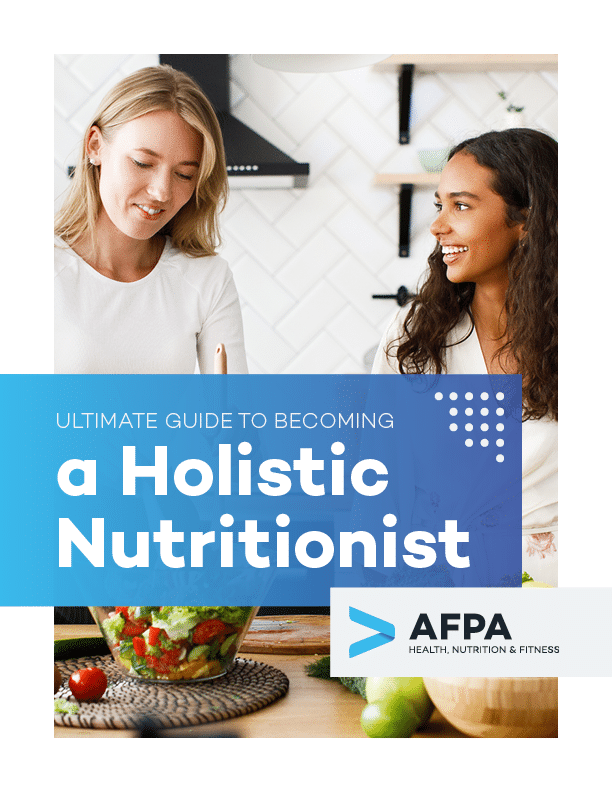As people become more empowered to take control of their health, nutrition is naturally a major area for personal change. But with so much research being released every day, and sometimes conflicting advice that comes from it, many of those looking for solid nutrition info need help navigating their way to wellness. That’s where a nutrition professional can come in and provide meaningful insights for a range of clients.
If you’re considering taking on this professional direction, then congratulations—you’ve chosen a growing and rewarding field that helps make a difference in people’s lives. From here, the first step after deciding you want to pursue this specialization is to look at your certification options.
Not only can a certification program give you a much better position when it comes to obtaining employment, but it also provides the type of knowledge you need to be a resource for your clients. You’ll get data-based education that can help you translate the complexity of nutrition into actionable, simple steps that others can follow.
American Fitness Professionals & Associates (AFPA) and the Institute for Integrative Nutrition (IIN) run two of the top programs in the industry. Thousands of nutrition professionals have been through one of these programs and gained the knowledge they needed for lifelong, satisfying careers.
But although each provides in-depth education on nutrition topics, they’re not identical. There are differences between the two that are worth noting, and it’s also valuable to see where they intersect. In order to help you make the most informed choice, this article will provide some insight on the specifics of each program so that you can choose what feels right for you.

Get Your Free Guide to Becoming a Holistic Nutritionist
Learn about the important role of holistic nutritionists, what it takes to be successful as one, and how to build a lucrative, impactful career in nutrition.
First, the Basics
Before we delve into the details of each nutrition-based certification program, it’s helpful to provide an overview of each organization:
AFPA
Offering certification programs online or through distance education for over 25 years, offers more than 20 different personal fitness trainer, group fitness instructor, nutritionist, holistic coaching, weight loss, senior fitness, youth fitness, yoga instructor, and Pilates instructor education programs. In addition, AFPA offers many specialty credentials in rehabilitation wellness, with more than 150 continuing-education courses in the industry.
AFPA has certified over 110,000 professionals in more than 124 countries. The organization’s mission is to provide students with affordable education that gives them the knowledge, skills, and awareness necessary to enhance their own lives, the lives of others, and the community at large. AFPA accomplishes this through innovative program design, teaching, research, and service focused on the professional practice of fitness, wellness, nutrition, health, and physical education.
IIN
IIN started in 1992 as a small classroom in a rented kitchen in New York City. Since then, it’s grown into one of the largest nutrition organizations and has graduates in more than 100 countries. The institute is also involved in food and policy issues—IIN led initiatives to help ban trans fat in New York City restaurants, for example, and its students and faculty have also marched in support of GMO-labeling legislation. IIN notes that its mission is to play a crucial role in improving health and happiness and, through that process, create a ripple effect that transforms the world.
Note on Accreditation
Both AFPA and IIN carry accreditation, which means that an outside agency has evaluated their programs to verify that they meet the criteria needed for nutrition professionals to operate in ways that are professional and informed.
Not all nutrition certification programs are accredited, but choosing one that has gotten that approval can open many more opportunities for you. Whether your career will take you into independent counseling or working in a healthcare setting, an accredited certification will give you the credentials you need to prove that your education was of the highest level.
Also, accreditation indirectly helps your clients, now and into the future, because it gives you the assurance that you’re learning from a program that’s been rigorously evaluated for its quality. That means you’re acquiring valuable insights and strategies that you can take with you into any client setting.
Certification Types
Now that we’ve covered what each organization has as its mission, let’s delve deeper into the specifics of their programs. Here’s a quick overview:
Holistic Nutrition Certification
This six-month certification program provides evidence-based, professional training in holistic nutrition, whole foods, and plant-based nutrition so that you can have the confidence to coach and consult clients on preventing disease and handling chronic conditions. The curriculum focuses strongly on how whole foods can provide nutrient density and optimal health, and the course delves into a broad array of topics, including USDA conflicts of interest, concerns about the modern healthcare system, genetics, food choices for illness recovery, GMOs, and meal planning. The course also includes extensive information on consulting skills such as assessments, marketing, goal setting, and developing strong relationships with clients. Also included are the Guide on Establishing & Optimizing Your Holistic Business and the Guide on Legal Guidelines for Unlicensed Nutrition Practitioners.
Holistic Health Coach Certification
The Holistic Health Coach Certification program is a 12-month program that is the only educational program that provides comprehensive training in Health Coaching and Holistic Nutrition, and Board Certification for Holistic Health Practitioner. The Holistic Health Coach certification program focuses on lifestyle wellness, optimal nutrition, in addition to physical activity, alternative therapies, herbology, homeopathy, holistic health promotion, health coaching concepts and motivational strategies.
IIN Health Coach Certification
This one-year online course offers nutrition education as well as business training in order to help students launch their own practices. Students explore the pros and cons of various dietary theories as a way to understand how to tailor nutritional plans for themselves and their clients. IIN also emphasizes the connection that food has to other parts of our lives, mainly relationships, careers, physical activity, and spirituality. Also covered are nutrition science, government policies, global nutrition issues, and alternative medicine.
Making the Choice
A nutrition certification will help you make a difference in people’s lives. Not only can you increase your income and broaden your opportunities through obtaining a certification, but you can also help clients meet specific nutrition and lifestyle goals, address chronic health concerns, and live more healthfully overall.
Demystifying the areas of nutrition science, research, wellness strategies, specific diets, and government recommendations can make you an in-demand expert with a range of options when it comes to your career.
To get started, evaluate the details of each program so that you can make a choice that’s right for you—whether that means affordability, learning at your own pace, course content delivery, or possibly all of those factors. Both AFPA and IIN are passionate about educating professionals who can help others live their best lives.
For both AFPA and IIN, the end result will be a certification that you can use to launch your business. It may also be an entry point for you to consider more extensive education, such as a college degree. Some who get a certification choose the most affordable option to make sure it’s a field that feels right for them—it’s a way to test the waters before investing thousands of dollars in a degree program.
We hope that the information in this article has helped clarify some of the intersections and differences so that you can make an informed decision.
To learn more about AFPA nutrition certifications, including specifics on coursework, visit the AFPA website. Our accredited certification programs are centered on what you need to know to succeed and are designed to meet the evolving needs of the nutrition field.

Get Your Free Guide to Becoming a Holistic Nutritionist
Learn about the important role of holistic nutritionists, what it takes to be successful as one, and how to build a lucrative, impactful career in nutrition.



